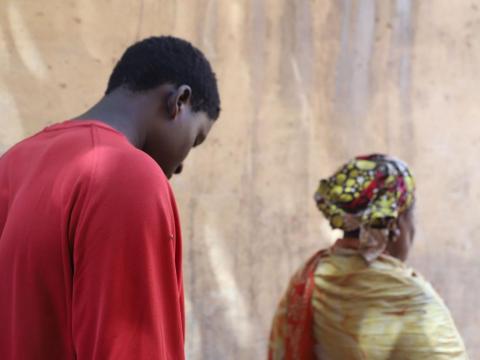World Vision’s Eco-Agriculture Project Contributing to Community Peace

Peace has long eluded many communities in Mali, with conflict over scarce resources often leading to clashes between farmers and herders. In the Gouba Inna, a village of over 3,3000 inhabitants located in the rural commune of Bema, they believe to have found a blueprint for peace. A community composed mainly of women and children, the main activities are agriculture, livestock and small trade.
Here we meet Makan, a leading Farmer Managed Natural Regeneration (FMNR) farmer and participant in World Vision’s Eco-Agriculture in the Sahel project.
“My name is Makan. [I am] 44 years old, from the village of Gouba Inna. Our village started the FMNR after a general meeting to introduce the approach in 2014 with the Eco-Agriculture in the Sahel project. The approach was voluntary and, in terms of investment, almost insignificant. I was the first to start this practice in the village. Over time, with the awareness sessions, several volunteers began to practice FMNR. Nowadays, all households in the village practice FMNR, covering more than 100 hectares. Today, I affirm that the practice of FMNR in our fields has led to a great improvement in cereal production. The land is fertile thanks to the Acacia Nilotic trees, the dominant species in the fields. Their falling leaves enrich the soil,” said Makan.
The FMNR, a factor in building community peace
The Eco-Agriculture project set up a brigade to protect FMNR forests and fields after the awareness sessions. This brigade protects the restoration gains made in the community.
“In January 2018, during the monitoring of the FMNR fields, I found herders from the village of Goulambe, a village resistant to FMNR, cutting bushy reserved trees in an FMNR field to build an animal enclosure,” Makan recounts.
“These farmers knew that they were trees were reserved to promote the FMNR. When I explained the prohibition on cutting FMNR plants, they wanted to beat me and so I withdrew to appeal to the other members of the environmental protection brigade and the mayor of the municipality. The chief of the Diema Water and Forest Cantonment intervened fining the herders 150,000 FCFA for the damage they caused.” With the threat of sanction, breeders [now] avoid farmers' fields and especially FMNR fields.
Before the savings groups, most of the women couldn’t even sit in the same place together. The strain on resources put a lot of social strain on our community.
“To ensure the sustainability of the project's achievements, in October 2018 a group of seven FMNR trainers was set up in the village and commune to not only promote FMNR and other agro-ecological practices, but also manage conflict cases, maintaining the peace gained,” Makan added.
Due to often insufficient rains, the Eco-Agriculture in the Sahel has also supported FMNR activities and market gardening production through savings groups (S4T), practiced by women in the region since 2016. In Gouba Inna there are four savings groups bringing the wives of farmers and herders together in collaborating, and they in turn bring their husbands together in mutual respect.
“Before the savings groups, most of the women couldn’t even sit in the same place together. The strain on resources put a lot of social strain on our community,” added Maimouna, Makan’s wife. “Now, we all work together and, as a result, we have enough for our families and we have collaboration between all of us.”
These women work together in the market place and develop their activities. One hundred women save money with the S4T approach, pay for their seeds, farm their plots on the site, sell their produce to save more and build cohesion in the community to improve their children's lives.
“We have FMNR, anti-erosion measures, crop management, improved stoves, liquid fertilizer production, etc., for the development of our communities,” Makan proudly said, “but importantly, we have gained instruments to restore sustainable peace between agriculture and livestock.”
Learn more about the Eco Agriculture in the Africa Sahel Project and World Vision's work with Partners in Mali.